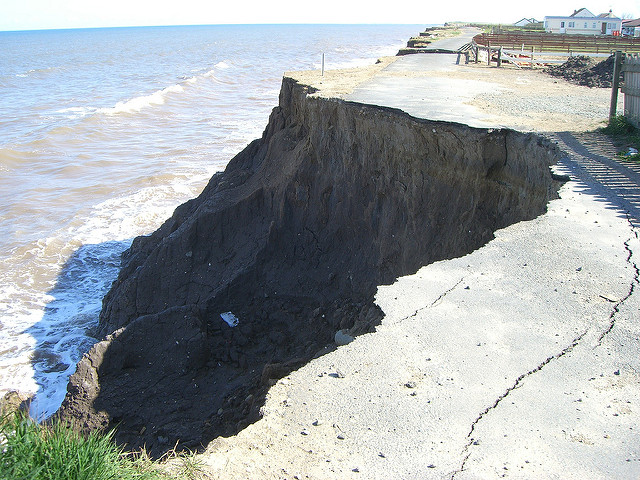Homes, roads and farmland around Britain’s coast will be claimed by the sea due to climate change, a Government advisory group has warned.
The Committee on Climate Change (CCC) says it will be ‘unaffordable’ to protect a third of the UK’s coastal property and infrastructure as sea levels rise.
In its latest report, the CCC says current Government policy to “hold the line” was not feasible and that radical new measures would be needed.
These could include moving whole communities inland, as well as rerouting rail lines, ports, power stations and other key infrastructure.
The committee says many people in coastal locations are not aware of the threat posed by coastal erosion due to rising sea levels.
Regions at risk include parts of the south and east which have shorelines prone to erosion, as well as low-lying land in east Anglia and Lincolnshire.
The Somerset Levels and stretches of coast between Liverpool and Blackpool are also at high risk, says the CCC.
Climate change will make it impossible to protect huge areas of the UK’s coast and render investment in flood defences worthless, they say.
Baroness Brown, who heads the CCC adaptation committee, said the Government’s current policies are “not fit for purpose.”
She added: “This report is a wake-up call to the fact that we can’t protect the whole English coast to today’s standard.”
“We could see as much as a metre of sea level rise before the end of the century, so within the lifetime of today’s children.”
The Environment Agency and local councils have drawn up shore management plans which would cost between £18 billion and £30 billion to implement.
But the CCC says that for large stretches of threatened coastline, protection would cost more than the value of land and property.
It estimates that 520,000 properties are in areas at significant risk of coastal flooding and this could rise to 1.5 million by the 2080s if nothing is done.
The Environment Agency has already predicted that around 7000 homes worth more than £1 billion will be claimed by the sea this century.
Another 100,000 properties, 1,600km of roads, 650km of railway lines and 92 stations will be threatened within 60 years, the CCC claims.
It also warns that toxic waste from old landfill sites could fall into the sea as the coast erodes, creating a potential environmental disaster.
Brown says people in coastal areas need better information about the risks, particularly those who are considering buying a home by the sea.
The CCC says government should work closely with councils and provide cash for long term projects that would include relocating people and infrastructure.
A Department for Environment spokeswoman said: “The government has committed £1.2bn of investment in coastal erosion and sea flooding projects over the next six years to better protect 170,000 homes.”




